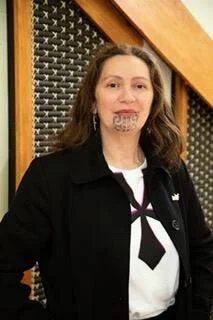TE RĀ TUARUA DAY TWO
Pātikitiki is a forum for kaimahi Māori to whakawhanaunga, celebrate & share Māori Frameworks utilised in practice. The kaupapa recognises the unique contribution kaimahi Māori make to uplift and protect mauri in the journey of whānau wellbeing. The tohu and name of the symposium are symbolic of the pātiki and represents favourable conditions, abundance. As kaimahi Māori, this is the environment we aim to create with our frameworks to inspire whānau to achieve their aspirations.
Hinewirangi Kohu Morgan
Ngāti Ranginui, Ngāti Kahungunu ki Nūhaka, Ngāti Porou
The Healer Witihin
Hinewirangi is an artist, poet, and a visionary. She is the Vice Chair of the International Indian Treaty Council and is a Representative for the Nuclear Free and Independent Pacific Movement. Hinewirangi teaches in Aotearoa and abroad, conducting workshops on all aspects of Māori philosophies of mental, physical, and spiritual well-being.
Kim Eriksen-Downs
Ngāti Tūwharetoa, Mōkai Pātea, Ngāti Kahungunu, Ngāti Awa
Te Hāpori Ora – The Village of Wellbeing
Servicing Community Hauora – Collectively, Consciously, Effectively
"The Voices of our Kaitiaki ora”
This presentation celebrates the value of community mobilisation and co-design within the scope of the transformation of all forms of violation, while focussing on whānau, hapu and community wellbeing development.
Can service users go on to be service providers within the transformation of all forms of violation? The answer is Yes! These Kaitiaki Ora, Wellbeing Practitioners, live with vision, and today we have collectively created a company to serve our wider communities. Te Hāpori Ora, The Village of Wellbeing has been birthed to celebrate our collective vision, within Tūwharetoa, transforming social development spaces.
We bring to life a conceptual framework depicting the evolution history of the virtual village of wellbeing. It is our belief if we provide spaces where peoples voices are genuinely heard. With appropriate supports to maintain and sustain their vision. We can achieve anything.
Their indigenous narratives are vital to ensuring we are accomplishing true co-design with communities whilst ensuring they can take ownership and repatriate themselves, to serve within their whānau hapū and communities, Nau mai haere mai come journey with us a while.
Wi Huata
Ngāti Kahungunu ki Wairoa, Ngāti Kahungunu ki Heretaunga
Ko te amorangi ki mua, ko te hāpai ō ki muri
Wi composed the waiata ‘Io’ for tangata whaiora and has shared it with many in the mental health and addiction sector. Whakataukī were included to honour the memories he has of his elder brothers, Hemi, Paraire and Tama.
Tumanako Tomo
Waikato, Ngāti Kauwhata, Rangitāne, Ngāi Tahu
Working with rangatahi
The purpose of his masters research was to understand the importance of incorporating Māori values (tikanga, wairua, whakawhanaungatanga) when engaging in Child Adolescent Mental Health Services. Tumanako explores how these values informed and shaped his practice as a Maori indigenous Youth Forensics clinical social worker.
Rameka Te Rahui
Ngāi Tūhoe, Tainui
Nō roto i te kohu … From within the mist
Opportunity to explore potential is complex specifically when Wairua, tikanga, mauri, mana, tapu, ahua, noa among many others clash. Everything exists in its own right for its own reason purpose and realities. A place to exist for every moment, a time is right when it is right, A cause is never without effect, these are compromised so too is the integrity of it all.
Patrick Salmon
Ngāti Awa
Patrick has shared his Māori model of practice called Tech-anga which is a fusion of Technology & Tikanga that supports indigenous innovation.
Dr Alayne Mikahere-Hall
Ngāti Whātua, Te Rarawa, Tainui
Kia āta poipoi, kia āta tūhono: Nurture and connect findings from the Tūhono Māori Research Study
Alayne was also an associate investigator on the E Tū Wāhine, E Tū Whānau: Wāhine Māori keeping safe in unsafe relationships research study and co-authored the report supported by the Marsden Fund and administered by the Royal Society Te Apārangi. This study sought to understand how Māori women keep themselves safe in unsafe relationships. She has an interest in developing evidence-based Māori and Indigenous interventions to find alternative ways for addressing psychological and emotional trauma and Mental Health difficulties for Indigenous people.
Kataraina Pipi
Ngāti Porou, Ngāti Hine
Oranga Ngākau
Oranga Ngākau is a model of practice that supports learning, healing and growth through music.
Kataraina will outline the three principles that underpin the model - waiata, wairua and waiora and discuss the notion of the alignment between oranga ngākau and Mauri Ora.
Whare Tukutuku
A collaboration between Te Rau Ora and the New Zealand Drug Foundation. The aim is to build a community based and informed mātauranga Māori approach to working with whānau experiencing Alcohol and other Drug (AOD) Primary harm.
Tracey Potiki
Kāi Tahu, Kāti Māmoe, Waitahā
Tracey has worked for more than 20 years to influence and make positive differences with and for whānau, hapū and iwi. She is committed to a reducing alcohol and other drug related harm within whānau and communities. Tracey is passionate about whānau ora and ensuring the voices of recovery whānau are heard across the nation.
Eugene Carnachan
Waikato-Maniapoto
Eugene is passionate and committed to enabling change through art and communication. As a researcher, writer and director, he has contributed to over 70 documentaries – primarily social commentaries, touching on justice, addiction and hauora.











